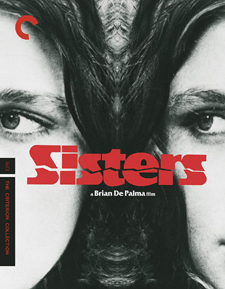Sisters (Blu-ray Review)

Director
Brian De PalmaRelease Date(s)
1973 (October 23, 2018)Studio(s)
American International Pictures (Criterion - Spine #89)- Film/Program Grade: A
- Video Grade: A-
- Audio Grade: B
- Extras Grade: A
Review
Sisters is Brian De Palma’s 1972 homage to Alfred Hitchcock. In addition to directing, De Palma co-wrote the screenplay based on his own original story and filmed it largely on Staten Island. Despite its low budget, this tense thriller has the look of a much more expensive picture.
Danielle Breton (Margot Kidder) meets Philip (Lisle Wilson) as contestants on a game show. They go out to dinner and take the ferry to Danielle’s Staten Island apartment, where they spend the night together. But the pleasant date turns jarringly violent and the point of view shifts to Grace Collier (Jennifer Salt), a neighbor with a direct view of Danielle’s window, who believes she has witnessed a murder. She calls the police and they investigate but find nothing suspicious.
A reporter for a local newspaper, Grace determines to get to the bottom of the mystery. As she investigates, the information she discovers about Danielle’s past places Grace in great danger.
De Palma’s deliberate Hitchcock touches include the use of subjective camera, an innocent person getting involved in serious peril, masterful build-up of suspense, and unforeseeable twists. Hitchcock aficionados will recognize influences from Psycho, Rear Window, Spellbound, and North by Northwest.
There is also a dark sense of humor that runs through the film to lighten the mood. Charles Durning plays a by-the-book private investigator hired by Grace’s newspaper to see if there’s anything to her claims that a murder was committed. Comic tension arises when she makes suggestions and he proudly proclaims his expertise. A conversation between Grace and her mother (Mary Davenport, Jennifer Salt’s actual mother) revolves around a recurring complaint: Grace is 25 and still not married.
De Palma uses split screen to show simultaneous actions that build suspense. In an early scene, Danielle is going into convulsions waiting for Philip to bring her medicine from the pharmacy. As she writhes in agony, we also see the unknowing Philip leisurely stopping at a bakery and buying a birthday cake for Danielle. Little does he realize that minutes count.
Sisters holds up quite well. Performances are excellent. Ms. Kidder plays Danielle with a French-Canadian accent and a fetching twinkle in her eyes. Her range is impressive and is crucial in making the plot believable. Ms. Salt’s Grace is appropriately brash, outspoken, and abrupt.
A prime ingredient contributing to the success of Sisters is the score by Bernard Herrmann, who scored many features for Hitchcock. His music adds to the tension of slower scenes and comes to chilling crescendos when on-screen images are intense. He’s the perfect composer for this psychological thriller.
Criterion's new 4K restoration, approved by Brian De Palma, was sourced from the original 35-mm camera negative and contains an uncompressed Dolby Digital monaural soundtrack. Aspect ratio is 1.85:1. Optional English SDH subtitles are included for the feature. Picture quality on this Region A Blu-ray release of necessity reflects the somewhat grainy quality of movies shot nearly half a century ago compared to movies made today. There are no scratches, dirt specks, or other imperfections. The color palette varies depending on the scene. There are almost glowing orange apartment hallways, dimly lit bedrooms, a simulated black and white documentary, and garish too-red blood. Outdoor scenes always appear cloudy, possibly a conscious choice based on the somber nature of the story.
Audio doesn’t have the dynamic range of full stereo. This isn’t that noticeable with dialogue scenes, but when Herrmann’s score accompanies visual-only scenes, it registers as rather thin.
Bonus materials include interviews, audio from a 1973 American Film Institute discussion with De Palma, a Margot Kidder appearance on The Dick Cavett Show, a photo gallery, radio spots, and a booklet containing a critical essay.
The Autopsy (2004) – this featurette is the best of the bonus materials because it features key creative personnel: director Brian De Palma, actors William Finley, Charles Durning, producer Edward R. Pressman, and editor Paul Hirsch. They discuss the Life magazine article that inspired the movie, casting, filming with a non-union crew, and being picketed by the Teamsters Union. De Palma talks about the split screen technique and the manipulation of images. He recalls his first meeting with Bernard Herrmann, whom he describes as a “gruff personality, very emotional.”
Jennifer Salt Interview – this new interview deals with how the actress met De Palma at Sarah Lawrence College. They did plays together and made the short film Jennifer. She moved to L.A. around 1970, met Margot Kidder, and they immediately liked each other and rented a house together. She believes the movie was shot in Staten Island because the location had a “neighborhood feel.” She outlines the rehearsal process.
AFI Discussion – this audio feature of Brian De Palma discussing Sisters at the AFI in 1973 is an option to hear while playing the movie.
Margot Kidder on TV – this is a clip from 1970 featuring Margot Kidder being interviewed on ABC’s The Dick Cavett Show. Cavett introduces her as a young actress whose latest film is Quakser Fortune Has a Cousin in the Bronx. The other guests are Gloria Swanson and Janis Joplin. Kidder is barefoot, wears enormous owl glasses, and seems very nervous.
Photo Gallery – black and white portraits of the stars and stills from Sisters are featured.
Booklet – the 32-page insert booklet contains a critical essay by Carrie Rickey, excerpts from a 1973 interview with De Palma on the making of the film, listing of cast and credits, and an article by De Palma on working with composer Bernard Herrmann. Rickey discusses the characters, De Palma’s stylish touches, his inspiration, and provides a detailed summary of the movie’s plot.
– Dennis Seuling

